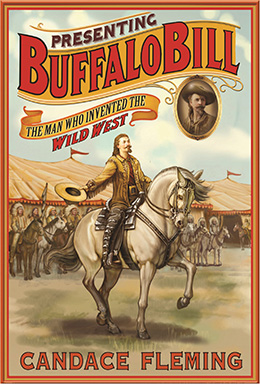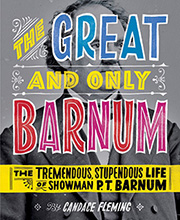BOOKS

Roaring Book Press
Macmillan, 2016
978–0‑375–84198‑9
ages 9 and up
buy the book
hardcover
e‑book
audio book
After you’ve read Presenting Buffalo Bill, try this book:
Presenting Buffalo Bill
The Man Who Invented the Wld West
Everyone knows the name Buffalo Bill, but few these days know what he did or, in some cases, didn’t do. Was he a Pony Express rider? Did he ride with Wild Bill Hickok? Did he “scalp” countless Native Americans, or did he defend their rights?
This, the first significant biography of Buffalo Bill Cody for younger readers in many years, explains it all. With copious archival illustrations, Presenting Buffalo Bill makes the great showman — perhaps our first true global superstar — come alive for new generations.
Resources
- Presenting Buffalo Bill Bookstorm (companion books, websites, videos)
- Presenting Buffalo Bill Bookmap
- Bookology magazine interview, “Candace Fleming Tames the Wild West”
- Presenting Buffalo Bill Teacher’s Guide
Awards and Honors
- American Library Association Notable Book
- Bulletin of the Center for Children’s Books, starred review
- Horn Book, starred review
- Horn Book Fanfare 2016
- Publishers Weekly, starred review
Reviews
“Fleming’s even-handed biography of William Cody, the “hardscrabble frontiersman who became America’s legendary showman,” is more than just the story of a larger-than-life figure. Fleming weaves Cody’s life into a history of the development of the West in the late 19th century and provides a clear and sensitive study of the treatment of American Indians during that era. Each chapter opens with a vivid description of a scene from the outrageously successful Wild West spectacle that Cody produced, followed by real-life events that link to — and possibly inspired — the scene. In comprehensive sidebars entitled “Panning for the Truth,” Fleming examines some of the hyperbolic tales Cody spun, holding them up to other primary and secondary sources for confirmation or dismissal. Fierce battles are described in detail, and historical figures such as Sitting Bull, Custer, Annie Oakley, and even Queen Victoria come to life in Cody’s incredible story, as do his relations with the loving family he was born into and the tenuous one he created. Fascinating period photos, an extensive bibliography, and online sources are included.” (Publishers Weekly, starred review)
“Fleming sets her sights on two connected myths of American history: William Frederick ‘Buffalo Bill’ Cody’s life story and the American frontier in the nineteenth century. Cody, a bodacious storyteller, embellished his autobiography with colorful additions to such events as his involvement in the 1857 Mormon War and claims that he rode for the Pony Express and killed Chief Tall Bull. In multi-paged sidebars Fleming addresses each incident, pointing out how his stories often differ from the historical record. Frequently, in ‘Panning for the Truth’ (as she titles these sidebars), she does not find definitive conclusions but, like a conscientious mathematician showing her work rather than simply stating an answer, offers a tutorial for evaluating historical sources. Exploring these exaggerations is important because Cody’s version of his life became the basis for his international show ‘The Wild West,’ seen by thousands in the United States and Europe. More than entertainment, this show created a romanticized Western frontier full of excitement, hostile Indians, sharpshooters, and brave scouts that defined a piece of American culture for decades. Underscoring that link, Fleming begins each chapter with a scene from the ‘Wild West’ show, using the theatrical production to introduce a time period in Cody’s life, which, unadorned, is still fascinating, as this man with a hardscrabble childhood makes and loses several fortunes over his lifetime. Frequent period photographs, a bibliography, source notes, internet resources, and an index (unseen) complete this clear and informative biography.” (The Horn Book, starred review)
“An author attempting a biography of William Cody steps into a minefield of challenges: making calls on cultural nomenclature and terminology; nuancing the Cody family’s anti-slavery and anti-abolition stance in Bleeding Kansas; reconciling Cody the Indian fighter with Cody the defender of Native traditions; and assessing the reliability of primary sources for a showman who depended on hyped promotion. Fleming artfully addresses the problems head-on, first with an opening note that clarifies her specific choice of terminology (tribal, when possible; “Native” variations when general; “Indian” variations when historical). Then the three-part structure of the biography itself sorts other issues into context. Each chapter opens with an italicized scene from Cody’s Wild West Show, steeping readers in the glamor, novelty, and thrills, and giving free rein to Cody’s story as he might have approved it, tempered with a few asides that call that account gently into question. The heavy lifting of examining source authority and viewing Cody in the context of his own time and ours is handled in boxed inserts titled “Panning for the Truth.” These sidebars are by no means comprehensive in discussing every questionable point in Cody’s career, but they appear often enough to put the brakes on an exciting story and remind readers that much of Buffalo Bill’s myth is as deceptive as his cleverly painted backdrops. Fans of Fleming’s The Family Romanov may marvel at the abrupt bounce from Russian Revolution to Wild West, but those who appreciate her authorial craftsmanship will recognize that she makes each of these great stories a window into countless others. Bibliography, notes, and index and period illustrations are included.” (Bulletin of the Center for Children’s Books, starred review)
“Fleming presents a lively, evenhanded portrait of William “Buffalo Bill” Cody, a master of self-promotion who became a world-famous entertainer and whose name became synonymous with “Wild West. “When his abolitionist father died from a savage attack after delivering an anti-slavery speech in “Bleeding Kansas,” 11-year-old Cody herded cattle, worked on wagon trains, and rode for the Pony Express. He joined the anti-slavery Jayhawkers, served the Union during the Civil War, and worked as a civilian scout during the Plains Indian Wars. He earned the nickname “Buffalo Bill” for single-handedly slaughtering thousands of bison. Throughout her chronicle of Cody’s adventures, Fleming notes the ever present challenge of distinguishing the realities of Cody’s life, given his penchant for embellishment and outright fabrication. Fleming depicts Buffalo Bill as the first global superstar, whose lasting fame came as a result of his Wild West Show, which toured throughout the United States and Europe and featured fellow living legends Sitting Bull and Annie Oakley. Fleming also suggests without exploring at great length that the show did much to mythologize the “Wild West” in the popular consciousness, with many misconceptions persisting. Illustrated with archival material and supplemented with extensive backmatter, this is a thoroughly engaging portrait of a fascinating, larger-than-life figure.” (Kirkus Reviews)
“Now Candace Fleming, the author of several acclaimed nonfiction books for younger readers, including The Family Romanov and The Great and Only Barnum, has taken on the task of unpacking Cody’s story, unscrambling the truth from the fiction and placing it within the history of the West.” (The New York Times, “Two Illustrated Books Re-Examine Legends … Wild West”)
“And Candace Fleming … now there’s an author clearly drawn to historical characters with slippery slidey morals. Her latest book, Presenting Buffalo Bill, is a splendid example of precisely that. Not quite a shyster, but by no means possessing a soul as pure as unblemished snow, had you asked me, prior to my reading this book, whether or not it was even possible to write a biography for children about him my answer would have been an unqualified nope. Somehow, Ms. Fleming has managed it. As tangled and thorny a life as ever you read, Fleming deftly shows how perceptions of the American West that persist to this day can all be traced to Buffalo Bill Cody. For good or for ill.” (Elizabeth Bird, Fuse #8)


